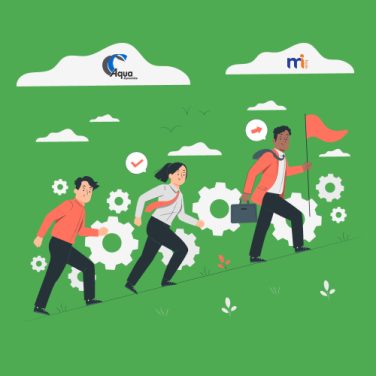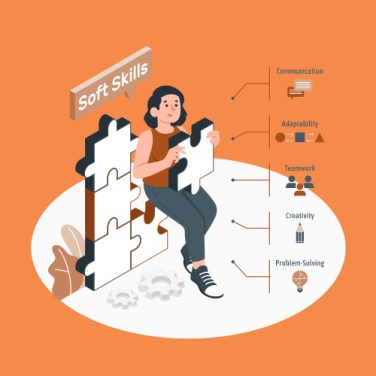The dynamic interplay between AI and human elements has become crucial in the landscape of modern recruitment.
Many organisations have embraced AI to enhance their recruitment efforts, taking advantage of its ability to automate repetitive tasks such as resume sorting and applicant tracking. This automation allows HR professionals to shift their focus from extensive data processing to more strategic and personalised interactions with candidates.
The role of AI in streamlining HR processes cannot be understated. Through the deployment of AI chatbots and smart analytics, potential candidates experience a more seamless recruitment process.
These technologies ensure efficient communication, immediate responses to inquiries, and even initial screening, thus enhancing candidate satisfaction and reducing drop-off rates during the application process.
Despite the significant advancements AI brings, the importance of human judgment remains a cornerstone of effective recruitment practices.
Human recruiters offer the personal touch needed to evaluate cultural fit, team dynamics, and interpersonal skills – aspects that AI might not fully capture. By balancing AI’s efficiency with human intuition and empathy, organisations can maintain a cohesive and relatable recruitment process that resonates with applicants on a personal level.
Addressing this balance is essential for navigating ethical considerations in recruitment.
By ensuring both AI and human oversight are integrated, companies can harness the full potential of AI tools while maintaining a personalised and ethical recruiting approach. This ensures that AI not only complements but also enhances human capabilities in delivering an insightful and empathetic hiring experience.
A more strategic approach to hiring

In recent years, AI has significantly redefined recruiter roles and processes, offering a more strategic approach to hiring.
By automating repetitive tasks, AI not only enhances recruitment efficiency but also liberates professionals to focus on engaging personally with candidates, thus maintaining the crucial human touch in recruitment.
One of the primary benefits of AI in recruitment lies in its ability to handle vast amounts of applicant data quickly and accurately.
AI tools like those offered by MiHCM excel in analysing applicant data, delivering insights that enable recruiters to make informed decisions faster and more effectively. This data-driven approach allows recruiters to delve into more strategic tasks such as enhancing candidate engagement and personalising the recruitment process.
Moreover, AI’s capacity to automate routine tasks like resume parsing and applicant tracking transforms traditional recruiting roles into more advisory capacities.
Supporting the decision-making process
Recruiters, equipped with AI insights, can now spend more time collaborating with hiring managers to develop recruitment strategies that align with the company’s cultural and business goals. This shift not only improves recruitment outcomes but also supports the strategic decision-making process within HR teams.
- Increased efficiency: By automating time-consuming tasks, AI reduces the administrative burden on recruiters, allowing them to focus on high-value activities.
- Enhanced data insights: AI tools provide recruiters with actionable insights into applicant trends and patterns, facilitating better decision-making.
- Strategic advisory roles: AI allows recruiters to step into strategic roles wherein they can craft more effective hiring strategies and improve the overall recruitment process.
Finally, through the seamless integration of AI tools, HR teams can leverage advanced analytics for enhanced recruitment efficiency. These tools not only streamline operations but also ensure the ethical use of AI by maintaining transparency in data handling and decision-making processes.
As recruiters adapt to these changes, they redefine their roles from mere administrative functions to strategic partners in workforce planning and talent acquisition.
Remarkable benefits and potential risks
Incorporating AI automation into recruitment brings both remarkable benefits and potential risks that organisations need to navigate thoughtfully. One of the standout advantages is the significant increase in efficiency.
By automating repetitive tasks, AI drastically reduces the time spent on manual processes like resume sorting, applicant tracking, and initial candidate screening. Automation ensures faster processing times, which can translate to quicker decision-making and ultimately more competitive hiring processes.
Improved candidate matching is another undeniable benefit of AI recruitment tools. By analysing vast data sets, AI systems can identify patterns and match candidates to positions based on skills, experience, and even behavioural profiles, which not only enhances the quality of hires but also supports building a diverse workforce.
With AI, the recruitment team can ensure that they are considering every potentially suitable candidate from wider talent pools, thus promoting diversity and inclusion improvements.
- Enhanced recruitment efficiency through automation.
- Increased processing speeds leading to faster hiring cycles.
- Optimised candidate-job matching algorithms.
Nevertheless, there are risks associated with over-reliance on AI in recruitment, such as inadvertent bias.
While AI can be designed to minimise human bias by focusing on skills-based matching, any bias present in the input data or algorithm design can lead to unfair hiring practices. To mitigate this, it’s essential to ensure that AI systems are programmed to prioritise ethical AI practices and are continuously monitored for performance.
Furthermore, an over-reliance on automation could diminish the human touch that is vital in recruitment. AI cannot entirely replicate the empathy and understanding that human recruiters provide when assessing cultural fit and interpersonal skills.
Organisations must therefore strike a balance, leveraging AI to handle routine tasks while reserving human intervention for the more nuanced aspects of candidate evaluation.
In maintaining this balance, companies can deploy strategic AI oversight frameworks ensuring that both technology and human judgment are actively contributing to the recruitment process.
For instance, checklists and regular audits can be established to assess the fairness and transparency of AI systems, fostering an environment that supports ethical recruitment practices without compromising the advantages that automation brings.
In summary, while AI offers tremendous benefits in improving recruitment efficiency and candidate matching, the potential risks should prompt organisations to maintain a vigilant approach to embedding AI into their hiring strategies.
By ensuring that AI is used responsibly and ethically, organisations can optimise recruitment outcomes while preserving essential human elements in the hiring process.
Integrating human oversight with Artificial Intelligence (AI) in recruitment processes is crucial to maintaining ethical standards and ensuring that the personalised touch of human recruiters is not lost.
Here are some strategies that companies can implement to achieve an effective balance between AI efficiency and human engagement.
- Utilise data-driven hr decisions: Tools like MiHCM Enterprise offer HR analytics and AI solutions that provide data-driven insights, allowing recruiters to focus on personal interactions with candidates. These insights help recruiters make objective, informed decisions that go beyond basic qualifications.
- Train recruiters on AI tools: Successful integration of AI requires that HR teams are well-versed in the functionalities of these tools. Training programmes should be implemented to help recruiters use AI effectively while retaining their advisory and decision-making roles.
- Maintain regular human interactions: Despite the automation capabilities of AI, personal interaction remains paramount. Recruitment processes should include scheduled face-to-face meetings or virtual interactions to evaluate cultural fit and interpersonal skills, aspects that algorithms may struggle to measure accurately.
- Establish accountability and transparency: Create frameworks for the transparent deployment of AI tools. Regular audits can ensure fairness and ethical use, as well as proper performance monitoring to avoid unintentional biases.
- Share success stories: Companies like Brother International Corporation and Thermo Fisher Scientific have successfully integrated AI with human oversight. Brother International used an AI-enhanced career site and a conversational chatbot, resulting in increased engagement and completed applications. Similarly, Thermo Fisher Scientific surpassed its internal hiring goals by leveraging an AI-powered CRM to identify suitable candidates from within their organisation.
By employing these strategies, organisations can integrate AI technology into their recruitment processes while preserving the human touch that is essential for ethical, personalised, and effective hiring.
MiHCM solutions, like SmartAssist, facilitate strategic decision-making and enhance recruiter efficiency, ensuring that AI not only simplifies administrative burdens but also complements human capabilities.
Furthermore, embedding AI within a framework of human oversight allows for a recruitment process that is not only data-driven and efficient but also ethical and empathetic. This balance fosters a dynamic recruitment environment where technology and human insight converge to produce superior hiring outcomes.
The use of ethical AI in recruitment
As Artificial Intelligence becomes increasingly embedded in recruitment strategies, ethical considerations are paramount to ensure fair and unbiased hiring practices. The use of ethical AI in recruitment involves navigating various challenges, from potential biases to maintaining transparency and accountability.
One of the fundamental concerns is the risk of bias in AI algorithms. While AI has the power to enhance recruitment efficiency by automating repetitive tasks and improving candidate matching, biases can arise from the data fed into these algorithms.
To manage this risk, organisations should prioritise using diverse and representative data sets when training AI systems. Regular audits and analyses are critical to assess the impact of AI decisions, ensuring they align with promoting diversity and inclusion.
Another key ethical consideration is transparency. Companies must be open about how their AI systems function and the data they utilise. By doing so, they can build trust with candidates and stakeholders. For instance, articulating the parameters and criteria used by AI to evaluate candidates can help demystify the selection process and reassure candidates that evaluations are fair.
Developing AI literacy among HR professionals
Developing AI literacy among HR professionals is crucial.
Decision makers in HR must understand both the capabilities and limitations of AI technologies. This knowledge allows them to use AI tools more effectively and ethically, maintaining a balance between automation and the human element.
It also ensures they can intervene when necessary, providing human judgment in areas where AI may fall short, such as assessing cultural fit or interpreting nuanced candidate responses.
- Ethical AI practices: Incorporate regular training on ethical AI use within HR teams to ensure responsible operations that adhere to legal standards.
- Transparency and accountability: Develop transparent frameworks for AI deployment and monitor systems to prevent unintentional biases.
- Regular audits: Conduct periodic evaluations of AI processes and outcomes to ensure compliance with ethical guidelines and improve decision-making accuracy.
By embedding these practices into their workflows, companies can leverage AI’s capabilities while safeguarding the human touch that remains essential for a personalised and empathetic hiring process. Emphasising ethical AI in recruitment not only aligns with legal and societal standards but also enhances the organisation’s reputation as a fair and inclusive employer.
To thrive in today’s competitive recruitment landscape, a balanced approach that leverages both AI and the human touch is essential. This dual approach enables HR professionals to harness the efficiencies of AI without losing the personalised interactions that candidates value.
Recruitment solutions like MiHCM excel at marrying these elements, ensuring processes are both data-driven and empathetic.
Streamlined operations and improved decision-making
The integration of AI in recruitment processes paves the way for streamlined operations and improved decision-making capabilities.
For instance, AI-driven analytics enable businesses to make informed workforce decisions, leading to better talent acquisition outcomes and enhanced strategic planning. However, maintaining human oversight is crucial to ensure ethical practices and safeguard against bias.
- Improve recruitment efficiency: AI processes high volumes of data quickly, allowing human recruiters to focus on strategic human-related tasks.
- Better candidate experience: Balancing automation with human interaction ensures that candidates feel valued and understood.
Organisations like those using MiHCM solutions highlight the potential for AI to transform recruitment processes, helping businesses stay ahead of their competition by combining the powers of AI and personal engagement.
By prioritising both AI efficiency and human interactions, HR leaders can ensure a holistic recruitment strategy that not only meets but exceeds modern challenges.
HR teams are encouraged to explore AI’s capabilities while ensuring human touches are integrated throughout the recruitment lifecycle. By doing so, they can create a more engaging, transparent, and efficient hiring process, satisfying both the need for ethical standards and personalised candidate experiences.



